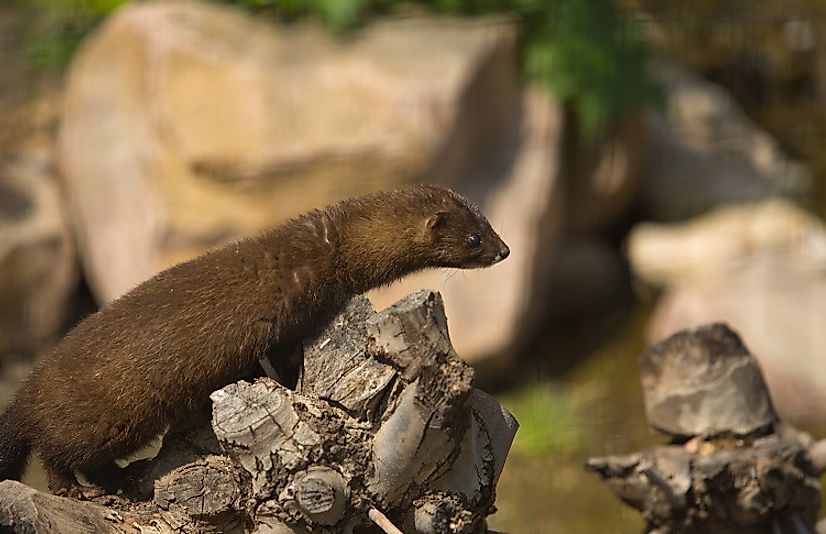Threatened Mammals of France

France, officially the French Republic, is a large country in Europe. The French Republic is composed of the mainland France and several overseas islands including the French Guiana. France covers an estimated 643,801 square miles and has a population of 66.7 million and, Paris is its Capital city. In spite of industrial and technological revolutions in France, natural environments, animals’ parks and forests still, exist in plenty. Some mammals in France have been declared endangered by UNESCO and the French authorities. The European mink do not occupy large territories due to sufficient food on the banks of rivers.
European Mink (Mustela lutreola)
The European mink, popularly known as the Russian mink, is a species of the Mustelid Family and is native to Europe. It shares some similarity with the American mink but it is smaller, and its skull is not specialized. It has no relationship with the American mink but can be associated with the European Polecat and Siberian weasel. The mink lives close to rivers and feeds on fish, frogs, and insects. The population of mints has been reducing by more than 50% over the past three generation, for that reason the International Union for Conservation of Nature and Natural Resources (IUCN). The mating season is characterized by the enlarging of male sexual organs that also turn pinkish–lilac. The losses of habitat, predation by the owl, red fox, the American mink, and changes in migration patterns of the fish and insects they feed upon are responsible for the decrease in their population.
Mediterranean Monk Seal (Monachus monachus)
The Mediterranean monk seal is the world’s rarest pinned species. It is estimated that there are fewer than 700 left in the Mediterranean Sea, their endemic habitat. An adult male seal is approximately 2.6 feet and weighs close to 694 pounds. Scientists believe that male seals are polygamous and became very territorial during breeding which peaks in October and November. They feed on fish, eels, squid and mollusks. In the past, female seals gave birth in open beaches, change in habitat have forced the seals to raise their young in deep caves that are inaccessible to humans. Conservation efforts by international organizations such as the Bonn Convention have been put in place to help reduce the loss of their loss and loss of their habitat.
North Atlantic Right Whale (Eubalaena glacialis)
The North Atlantic right whale is a baleen whale. The callosities on their heads distinguish the whales from other species. They are docile and have slow surface-skimming feeding behavior. The whales has a high content of blubber which made them a target for whale hunters. Due to their low numbers nearing 400 in the North Atlantic Ocean, they are protected by the US Endangered Species Act. The whales feed on copepods, larval barnacles, pteropods and small invertebrates. The whale has a gestation period of one year, and they first give birth at the age of nine or ten. Climate change poses a major threat to their existence as the change in sea temperature alters their habitat and their food patterns.
Mouflon (Ovis orientalis orientalis)
The mouflon is a subspecies of wild sheep. It is believed that the mouflon is the ancestor of the modern sheep. Their coats are red-brown and short-haired. Males are horned while some females are polled. They are natives of Iraq, Iran, and Armenia but were later introduced into Europe including France. Their habitat are steep mountains and migrate to lower altitudes during winter. Male mouflons establish dominance hierarchy during mating season. They reach sexual maturity at two years, and female their gestation takes five months. They have been declared a threatened species by the French authorities due to hunting and change of habitat.
Threatened Mammals of France
| Threatened Mammals of France | Scientific Name |
|---|---|
| European mink | Mustela lutreola |
| Mediterranean monk seal | Monachus monachus |
| North Atlantic right whale | Eubalaena glacialis |
| Mouflon | Ovis orientalis |
| Garden dormouse | Eliomys quercinus |
| Pyrenean desman | Galemys pyrenaicus |
| Bechstein's bat | Myotis bechsteini |
| Barbastelle | Barbastella barbastellus |
| Mehely's horseshoe bat | Rhinolophus mehelyi |
| Fin whale | Balaenoptera physalus |











